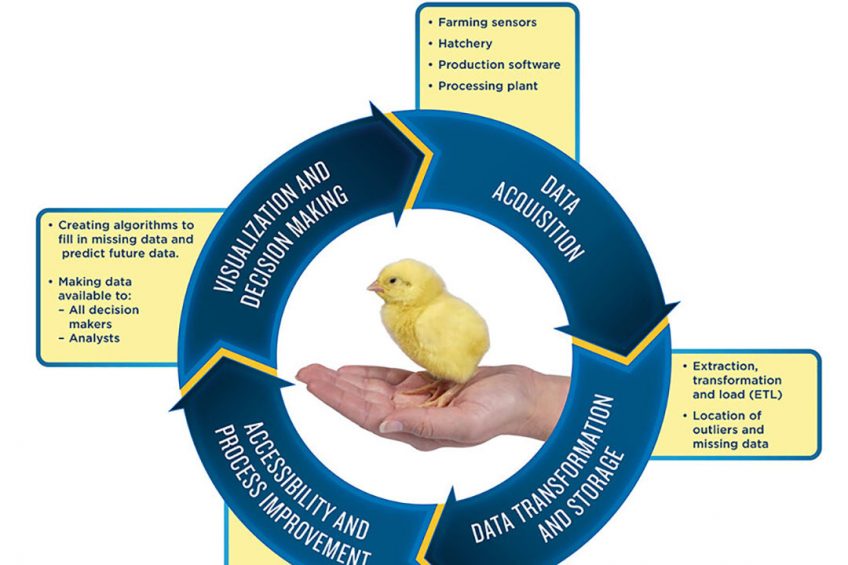Future calls for proper data governance

Covid-19 is pushing the poultry industry to adopt ‘Smart Farming’ quickly. Everyone is dreaming of the day when, with a click of a button, they can change the feed allocation of the flock, look at the nutrients fed, check the litter quality and birds’ bodyweights, change ventilation settings, and many other things.
Others may dream even bigger. They want to have answers from all the data collected from sensors in the hatcheries, feed mills and farms. This information will help them to understand the impact in the processing plant through algorithms that alert them to what has happened and how they can improve the flock currently on the ground. The sensors and algorithms to make sense of the data are available right now. However, there are still some hurdles to be overcome. For example:
- A reliable internet connection on farms. Even though advances have been made in this area, in practice, not many poultry farms have reliable internet connectivity given that some are in remote locations for biosecurity reasons.
- Good security. You want to avoid, for example, that someone mistakenly or maliciously shuts down your feeding and watering systems.
- Proper data governance in place to make it all happen.
Data governance: the foundation
Data governance is like the foundation of a house – the necessary basis to change the way we run a poultry business. Without proper data governance companies will waste time and money on projects which try to collect all the necessary data to make decisions that will enable them run their operations from the comfort of the office. Or, as we have seen with COVID-19, they may be forced to keep their businesses running while quarantined at home.
Many believe that Information Technology (IT) departments are equipped with the necessary infrastructure to handle this requirement because, after all, they are the ‘computer guys’. However, the truth is that the skills required to integrate all the relevant internal and external data sources to make them available in one location for analysis, are new to most IT departments. Data governance promotes trust and is about acquiring, storing and using data securely and effectively so it can be put to good use. Data governance makes it possible to have the right data available at the right time to gain insight. It will help us to make timely and well-informed business decisions. To ensure proper data governance is in place you will need people who understand the business and have the skills to be able to clean and organise large quantities of information. They should also be comfortable speaking the language of the poultry business to be able to translate the results in ways that can easily be understood by everyone.
Connecting the dots
A successful data program will discover all the data available in the company, understand how to connect all the different systems and ensure that data quality issues are addressed before implementing prediction algorithms, therefore improving decision making. A good data analyst will also be able to tell an excellent story with the data, as decisions are made not just because of numbers but because of the story they reveal.
For most companies an internal restructuring may be required to get an effective data governance structure in place. The restructuring will likely involve the IT department because without proper guidance and understanding IT will never be able to meet your business requirements. The IT department would continue to be responsible for the helpdesk and infrastructure, while a new department, let’s call it the Data Analytics department, would handle all other obligations to ensure that existing and new systems have the right data structure to provide connectivity. This new department would be responsible for designing data governance that will allow a more dynamic response to business needs and wants.
Becoming a ‘smart farm’
Once proper data governance is in place, poultry businesses will be able to reap its manifold benefits. These include lower costs associated with other areas of data management, more accurate procedures around regulation and compliance activities and greater transparency within all data-related activities. Good governance also helps with instituting better training and learning practices around the management of data assets, increased value (and protection) of data and makes it possible to provide standardised data systems, data policies, data procedures and data standards. Last but not least, it will lead to improved monitoring and tracking mechanisms for data quality and other data-related activities. Effective data governance will put poultry producers on track to take the lead in the ‘Smart Farming’ of the future with all the tools at their fingertips to efficiently manage a successful business remotely.
Author: Sergio Guerra
Join 31,000+ subscribers
Subscribe to our newsletter to stay updated about all the need-to-know content in the poultry sector, three times a week. Beheer
Beheer











 WP Admin
WP Admin  Bewerk bericht
Bewerk bericht